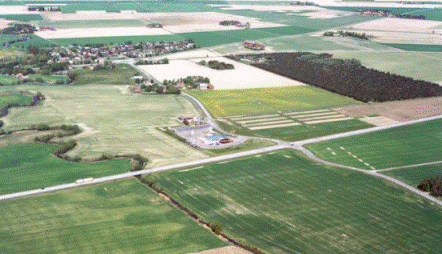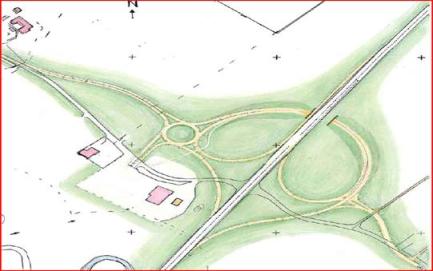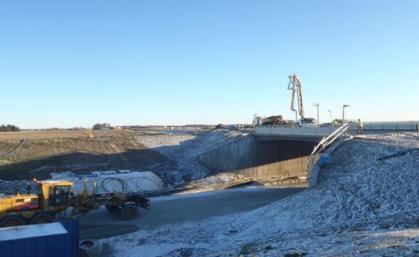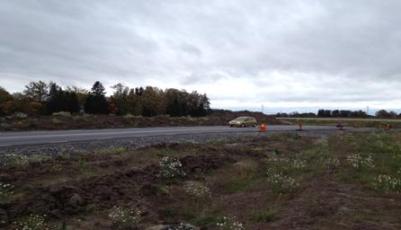Trafikplats
Jung |
|
Construction Only Award
Project Team
Client: Trafikverket
Designer: Trafikverket
Construction: Skanska
Sverige AB
The Project
Skanska was contracted by Trafikverket (the Swedish Transport
Administration) to carry out the transformation of the existing crossroad
highway E20/local road 2623. The former one-level intersection was replaced
by a new in-situ concrete bridge that created a grade separated junction,
with the purpose to improve the road safety and accessibility for all
road users.

Original intersection
The project included excavation, construction of a water sewage system, land use planning, soil stabilisation, a bridge, in-situ retaining wall, road superstructures and asphalt. The project was carried out in 2012 with a contract sum of 65.48 million SEK.

Simple drawing of the new intersection
CEEQUAL was not a requirement in the contract, but after discussions,
Skanska and Trafikverket decided together to aim for an award, to show
their commitment towards sustainability.
Challenges faced
Landscape
Skanska initiated a new geotechnical survey and discussed the results
with Trafikverket in the very beginning of the project. The results
from the new survey significantly reduced the need for lime-cement injections
to stabilise the ground, thus reducing the carbon footprint, spending
and the amount of work required. The new geotechnical survey was the
main reason why the project finished about 10 months earlier than planned.

Building of the tunnel/bridge under highway E20
Energy & Carbon
The carbon footprint for all the key materials in the project was reduced
by a total of ca 506 tons CO2-equivalents ( 21%), compared to the original
design.
The reduction of lime-cement alone decreased the carbon footprint by 487 tons CO2-equivalents. The project also decided to use grass instead of gravel as erosion protective material on the slopes. The use of grass reduced the carbon footprint, rand the transport of material to the site, and also increased the green area within the project.

The new roundabout next to the gas station
Waste Management
None of the waste from the project was sent to landfill. All top
soil masses were re-used as top soil within the project, which was a
requirement from Trafikverket. 33% of the excavated material was reused
within the project area. About 74% of the existing materials on site,
such as old asphalt, railings, road signs, traffic poles, were incorporated
into the project.

Excavations for the local road to pass under the highway
Material Use
A large amount of excavated material was donated to benefit the nearby
community, such as the building of a small sledding slope for a local
sportsclub. Surplus material was also used to extend a parking lot at
the local community center, and surplus clay was used to protect a local
groundwater reservoir from pollutants.
Furthermore, the project only used electricity from renewable resources.The site-sheds used were 50% more energy efficient than average, with low flushing taps and shower heads. Instead of water, salt was used as the dust controlling component during the entire project. Excavators used GPS-steering systems that maximised the efficiency and the precision of excavations, which reduced the amount of time, spending and emissions.
Transport
After a stakeholder meeting, Skanska and Trafikverket decided to
build a new access road to a nearby farm, due to a temporary increase
of traffic during the project.

Temporary road during the project, bunds in the background
CEEQUAL influence
CEEQUAL highlighted the sustainability questions even more. Although
Skanska already has high ambitions within sustainability, CEEQUAL pushed
the ambitions even further, and rewarded as well as challenged some
of the decisions within the project. Some topics were highlighted merely
because of the assessment, such as calculations of re-used materials,
green areas, targets for carbon reductions, etc.

